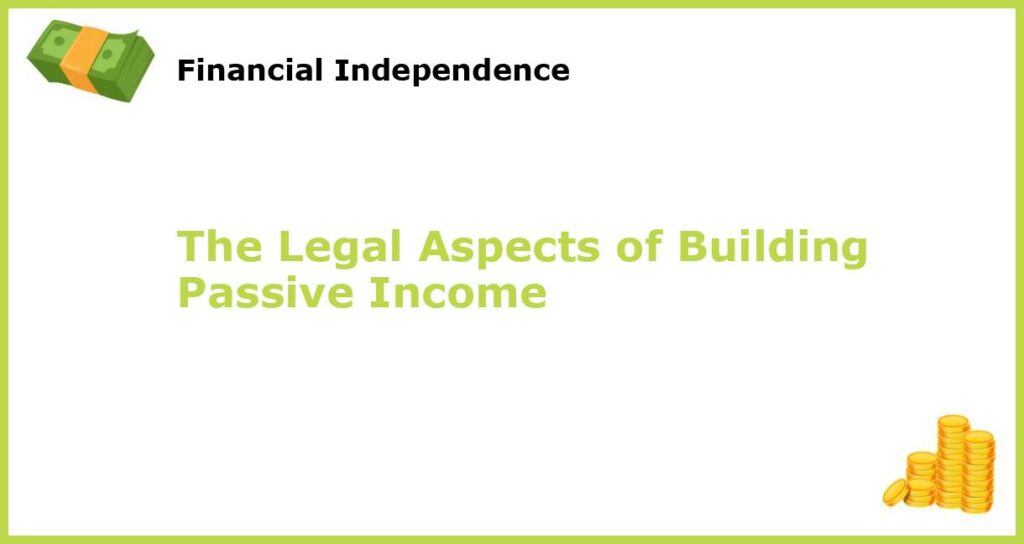Passive income is the dream of every businessman, entrepreneur, or individual seeking financial independence. Receiving earnings without lifting a finger sounds appealing to anyone who desires to enjoy life without the stress of constant work. Indeed, Passive income is a money-making strategy where individuals earn money from rental properties, investments, and other sources without any active involvement.
Understanding Passive Income

Passive income is the earnings that an individual derives as a return from investments, assets, and other sources where the individual does not have to work directly to earn the income. It is the income that an individual makes without much physical presence, unlike the regular active income. Passive income is viewed as a professional approach to build wealth without excessive physical involvement.
Legal Issues Involved in Passive Income

Despite its appealing benefits, passive income attracts legal implications that entrepreneurs, businessmen, or individuals must consider. Rental properties, investment properties, and other assets built through passive income attract their set of legal issues, such as property rights, taxation laws, contracts, and other considerations that significantly redefine passive income’s legal landscape.
Taxation and Passive Income

Understanding taxation in earning passive income is essential in every entrepreneur’s financial planning. Passive income is subject to taxation, and every individual must report it to the government. As passive income attracts taxation, understanding the different tax codes within the financial system, especially the various tax deductions, becomes necessary to reduce the impact of taxation on passive income earnings.
Real Estate and Passive Income

Real estate investments have become a popular source of passive income. Rental properties can provide a steady stream of income for an extended period. However, such investments come with some legal considerations that interested individuals must nitpick. Property management, leases, tenant rights, and landlord-tenant laws are some legal areas that a real estate investor must understand to build passive income through real estate investments.
Investments and Passive Income

Investing in the stock market, dividends, and mutual funds are quite common ways by which individuals forge passive income. As impressive as those investments seem, legal implications come with it that must be navigated with care. Securities laws, insider trading laws, and any other-related legal difficulties must be considered when building passive income through investments.
Intellectual Property and Passive Income

Intellectual property is another dependable way individuals accumulate passive income. Trademarks, patents, and copyrights generate earnings without direct involvement. Nevertheless, before plunging into such an adventure, individuals must carefully consider the legal implications surrounding intellectual property. Licensing issues, infringement problems, and other legal entanglements could surface that require reliable legal advice to guide organizations or individuals infusing intellectual property into their passive income schemes.
Contractual Agreements and Passive Income

Agreements formed between parties investing in passive income are essential to form legal protection and determine the terms of the earnings arrangement. It helps to achieve a legal structure that could protect parties in case anything goes wrong during the business transaction or relationship. A fair and precise agreement backs up a passive income venture, providing a legal safety net whenever disputes arise. Therefore, an understanding of the terms of contractual agreements is crucial to building and protecting passive income investments.
Legal Professionals and Passive Income

Working with legal professionals is a crucial consideration when building passive income. Lawyers and other legal professionals can help navigate the legal implications of building passive income while providing comprehensive legal protection. They can draft contracts and provide sound legal advice on taxation and other legal issues concerning passive income. Identifying a reliable and experienced legal team could provide passive income investors with a delightful and smooth-sailing business journey.
Legal Compliance and Passive Income

Legal compliance is a vital aspect of building passive income. Adherence to tax codes, property laws, and securities laws eliminates legal issues and protects passive income. Working closely with legal professionals and remaining informed on legal changes is crucial to staying compliant, preventing legal issues, and preserving passive income. Compliance with the law covering passive income fortifies an investor’s protection and shields the investor from setbacks.
Conclusion
Building passive income is an optimal financial strategy in the world of business, but it is not immune to legal ramifications. Understanding the legal bottlenecks associated with passive income and working with legal professionals is an integral part of accomplishing success. Tax codes, property laws, and other legal factors must be satisfactorily considered to avoid legal issues and protect passive income.







